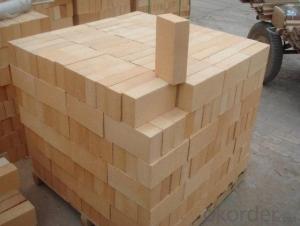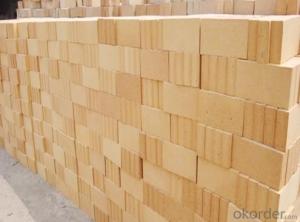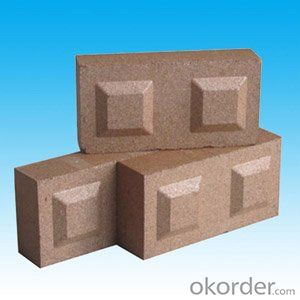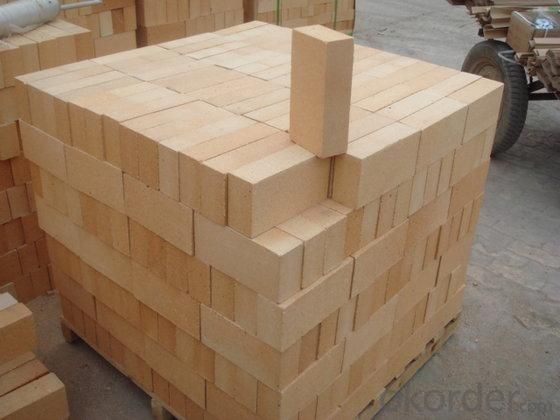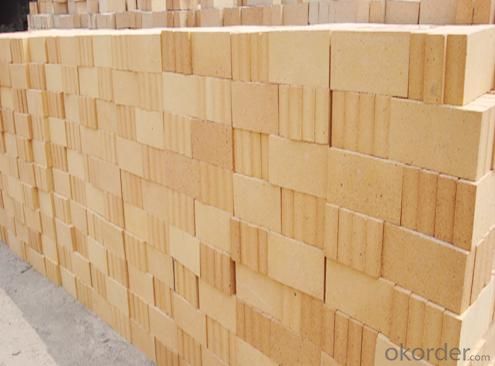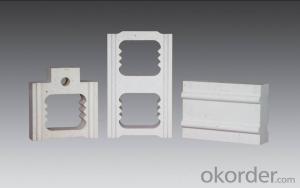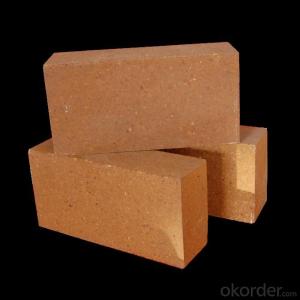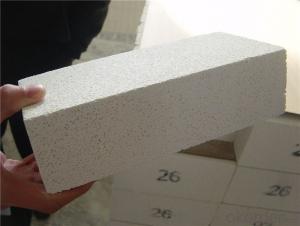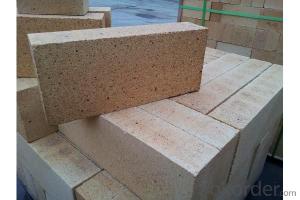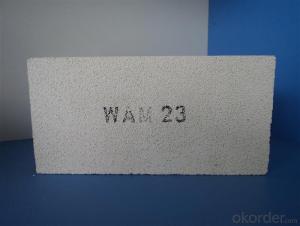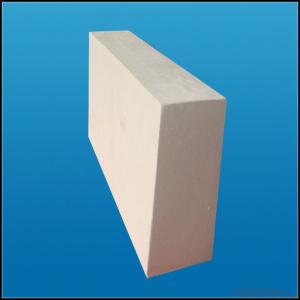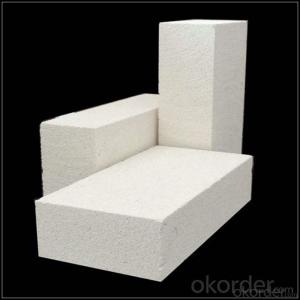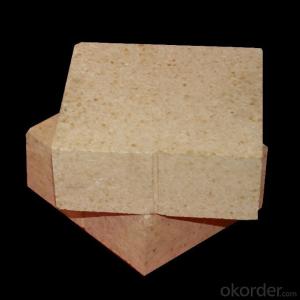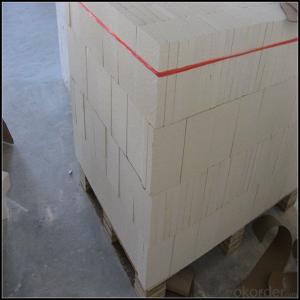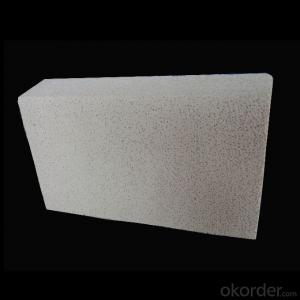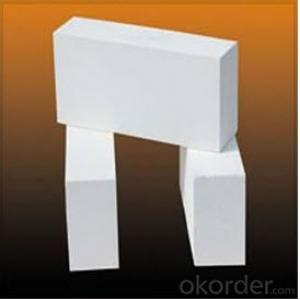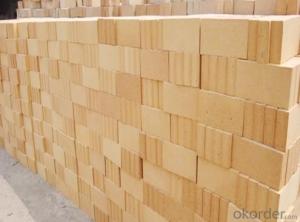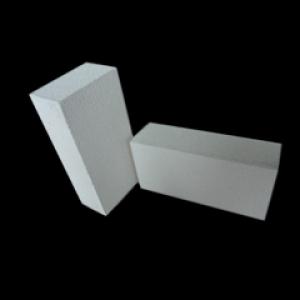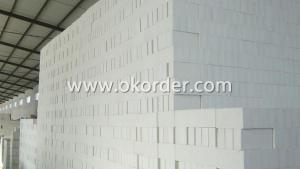Insulating Fire Brick - Refractoriness SK32 1710C for Clay Brick
- Loading Port:
- China main port
- Payment Terms:
- TT OR LC
- Min Order Qty:
- 50 m.t.
- Supply Capability:
- 5000 m.t./month
OKorder Service Pledge
OKorder Financial Service
You Might Also Like
CNBM conforms strictly to the requirements of ISO 9000 quality control system during the production. MSDS is also available if you want. The thermal insulation fire clay brick meet with the requirements of ASTM & JIS standards. So pls stay cool with our quality.
Insulating Fire Brick Technical index
Product No. | IFB70 | IFB60 | IFB50 | IFB40 |
Al2O3 | 68%-72% | 58%-62% | 48%-52% | 38%-40% |
Refractoriness (°C ) | ≥1790 | ≥1790 | ≥1790 | ≥1790 |
Bulk density (g/cm3) | 2.50-2.60 | 2.35-2.45 | 2.20-2.30 | 2.10-2.20 |
Apparent porosity (%) | 22 | 19-22 | 17-20 | 17-20 |
Cold Crushing strength (kg) | 480-510 | 450-480 | 430-450 | 390-430 |
Application
Insulating Fire Brick are used for the lining of converter, alternating current arc furnace, direct Current arc furnace and the ladle slag line, etc.
Equipment
1 unit of Ceramic Abrasive (SG Abrasive) pilot production line
2 units of Compact grain Abrasive pilot production lines
1 unit of high-end coated abrasives (abrasive cloth) production line
Company Advantage
(1)Long Insulating Fire Brick manufacture history: 25 years manufacturer
(2)Advanced equipment
(3)Diversification of production standards: ISO ANSI FEPA JIS ASTM
(4)Flexible payment: T/T L/C D/P D/A
(5)Professional marketing team and after-sale service
(6)Free sample
FAQs
Q1 |
What’s the transport method? |
A1 | FCL delivery goods with wooden pallet or wooden case by sea; If LCL delivery, must with wooden case; Sometimes need open top, flat rack or bulk cargo. |
Q2 |
What’s the required payment term? |
A2 | Generally 30% TT as the prepayment, 70% TT before delivery. If need, 100% Irrevocable Letter of Credit or negotiation. |
Q3 |
Which country are our products exported to? |
A3 | Apart from entire Chinese market, the US, Russia, Japan, Korea, Australia and some Southeast Asian Nations. |
- Q: Can insulating fire bricks be used for insulation in incinerators?
- Yes, insulating fire bricks can be used for insulation in incinerators. Insulating fire bricks are made from lightweight refractory materials and have high insulating properties, making them ideal for applications that require heat containment and energy efficiency, such as incinerators. These bricks have low thermal conductivity, which means they can effectively trap and retain heat within the incinerator, preventing it from escaping and improving the overall efficiency of the incineration process. Additionally, insulating fire bricks are resistant to high temperatures and can withstand the harsh conditions typically found in incinerators, making them a reliable choice for insulation purposes.
- Q: Can insulating fire bricks be used in high-temperature insulation panels?
- Yes, insulating fire bricks can be used in high-temperature insulation panels. Insulating fire bricks are designed to withstand and retain heat, making them an ideal choice for applications that require high-temperature insulation.
- Q: What is the typical density of an insulating fire brick?
- The typical density of an insulating fire brick can vary depending on the specific composition and manufacturing process. However, in general, insulating fire bricks have a lower density compared to regular fire bricks. The typical density of an insulating fire brick can range from 0.8 g/cm³ to 1.2 g/cm³. This lower density is achieved by incorporating insulating materials like lightweight aggregates or organic fibers into the brick's composition, which helps to reduce heat transfer and increase thermal insulation properties.
- Q: How shall the sintered porous self insulation bricks be laid at the bottom of the beam?
- And the concrete beam should be broken brick masonry. Top packing.
- Q: Can insulating fire bricks be used in high-temperature insulation boards?
- Indeed, high-temperature insulation boards can utilize insulating fire bricks for their thermal insulation needs. These bricks are specifically engineered to endure extreme temperatures while offering exceptional thermal insulation. They find widespread use in various applications demanding insulation under elevated temperatures, including kilns, furnaces, and fireplaces. By incorporating insulating fire bricks into high-temperature insulation boards, one can effectively reduce heat loss and uphold a consistent temperature. Nevertheless, it is crucial to assess the particular prerequisites of the application and verify the compatibility of the insulating fire bricks with the insulation board material and installation technique.
- Q: Are insulating fire bricks resistant to thermal conductivity?
- Yes, insulating fire bricks are designed to be resistant to thermal conductivity. These bricks are made from materials with low thermal conductivity, such as lightweight refractory fibers or insulating materials like vermiculite or perlite. The purpose of insulating fire bricks is to provide thermal insulation and prevent heat transfer, making them ideal for applications where temperature control is important, such as in kilns, furnaces, or fireplaces. By reducing thermal conductivity, insulating fire bricks help to retain heat within the desired area and minimize energy loss, making them an effective choice for insulation in high-temperature environments.
- Q: How do insulating fire bricks contribute to energy efficiency?
- Insulating fire bricks contribute to energy efficiency by providing excellent thermal insulation properties, which help to minimize heat loss and retain heat within a structure. This insulation reduces the need for excessive heating or cooling, resulting in lower energy consumption and cost savings.
- Q: Can insulating fire bricks be used in electric arc furnaces?
- Yes, insulating fire bricks can be used in electric arc furnaces. Insulating fire bricks are made of lightweight materials with high insulating properties, which make them ideal for applications where heat insulation is required. Electric arc furnaces generate high temperatures and require effective insulation to contain the heat within the furnace chamber. Insulating fire bricks can withstand the intense heat produced in electric arc furnaces, preventing heat loss and conserving energy. Additionally, their insulating properties help maintain a stable temperature inside the furnace, ensuring efficient melting and refining of metals or other materials. Therefore, insulating fire bricks are a suitable choice for use in electric arc furnaces.
- Q: Are insulating fire bricks suitable for use in carbon black furnaces?
- Yes, insulating fire bricks are suitable for use in carbon black furnaces. These bricks are known for their high insulation properties, which help in maintaining high temperatures inside the furnace while preventing heat loss. Additionally, insulating fire bricks are designed to withstand extreme temperatures and chemical reactions, making them a suitable choice for carbon black furnaces that operate under high heat and harsh conditions.
- Q: Can insulating fire bricks be used in a refractory lining?
- Indeed, refractory linings can incorporate insulating fire bricks. These bricks are purposefully crafted to offer thermal insulation and minimize heat dissipation in scenarios involving high temperatures. Possessing low thermal conductivity and exceptional insulating properties, they are perfectly suited for use in refractory linings. By curbing heat transfer to the surrounding environment, these bricks contribute to the enhanced energy efficiency of furnaces, kilns, and other industrial applications. Moreover, insulating fire bricks are lightweight, effortlessly installable, and exhibit commendable strength and durability, rendering them a favored selection for refractory linings.
Send your message to us
Insulating Fire Brick - Refractoriness SK32 1710C for Clay Brick
- Loading Port:
- China main port
- Payment Terms:
- TT OR LC
- Min Order Qty:
- 50 m.t.
- Supply Capability:
- 5000 m.t./month
OKorder Service Pledge
OKorder Financial Service
Similar products
Hot products
Hot Searches
Related keywords

